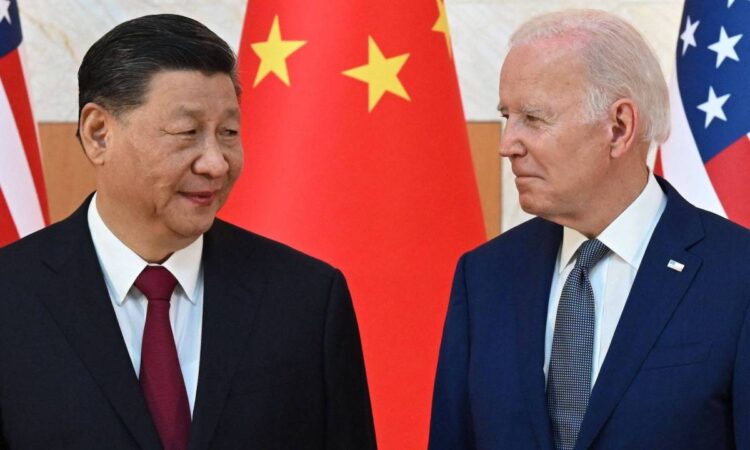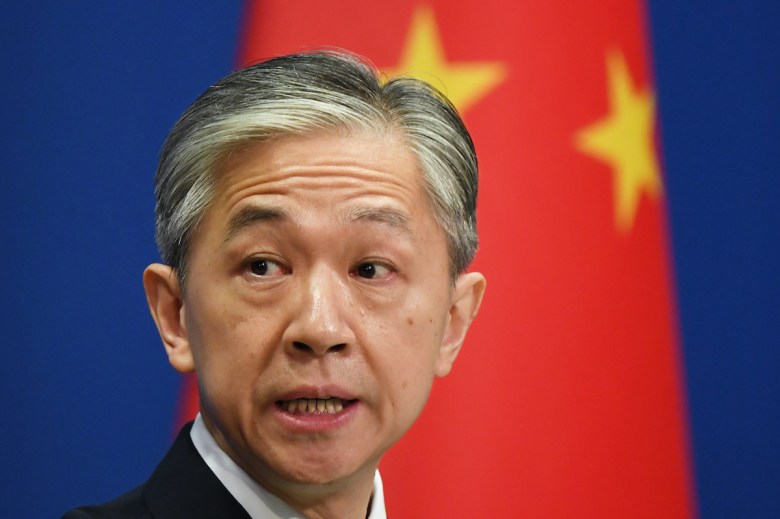
Beijing has called the Biden administration a “bully” as the White House is going to ban American funds and companies from investing in China’s high technology sectors.
United States President Joe Biden is expected to sign an executive order that will restrict US companies and private equity and venture capital funds from investing in China’s microchips, artificial intelligence, quantum computing, biotechnology and clean energy projects and firms, Politico and Bloomberg reported. Biden will try to announce these investment curbs before the G7 Summit and ask US allies for support.
The curbs, if implemented, will not have a big impact on China’s high technology sectors, said Wu Chaoze, chief telecom analyst at CSC Financial Co. The scale of US investments in China’s AI, chip and quantum computing is not substantial as American funds have avoided investing in Chinese technology firms for a few years, he said.
With a current account surplus now running at a $400 billion annual rate, China is a net investor in other countries, according to some commentators. It does not need foreign capital; on the contrary, it has capital to invest elsewhere.
But American venture capitalists offer expertise and advice as well as funding, and a ban on US investment in certain high-tech fields entails disadvantages for China, and also inhibits the reflow of intellectual property back to the US, commentators said.
Despite a mild impact on its industries, Beijing was furious about the Biden administration’s move.
“This is naked economic coercion and technological bullying, which seriously violates the principles of market economy and fair competition and disrupts the international economic and trade order and the stability of global industrial and supply chains,” Wang Wenbin, a spokesperson of the Chinese foreign ministry, said Friday.
“The US has gotten used to politicizing and weaponizing economic, trade and technological issues under the guise of national security,” Wang said. “The real purpose of the US is to deprive China of its right to development and safeguard its own hegemony and self-interest.”
He said the US tried to push forward a decoupling with China and use economic coercion to pressurize its allies and get benefits. He said China will closely monitor the developments and resolutely safeguard its own rights and interests.

Long debate
Politico’s report published Tuesday said Washington’s unprecedented curbs will require US companies to notify the government of new investments in China’s high technology sectors and prohibit some of these deals. Originally the measures should have been announced in late 2022 but the announcement was delayed as the officials of the National Security Council and the Treasury Department held different views, it said.
Some aspects of the coming executive order are still being finalized but economic officials have already started briefing industry groups including the US Chamber of Commerce, Politico reported.
The Biden administration will in coming weeks announce the executive order, which has been discussed for almost two years, Bloomberg reported on Thursday. The administration has briefed its G7 partners on the investment curbs but does not expect US allies to announce similar restrictions at the same time.
The executive order will focus on investments in which US companies play active roles in management, such as private equity and venture capital funds and joint ventures that involve some forms of technology transfer.
In May 2020, then-US President Donald Trump and the Labor Department banned the US federal pension funds from investing in Chinese stocks, saying that some of the firms could pose a threat to US national security. In November of the same year, Trump signed an executive order banning US investors from buying shares in 31 Chinese firms that are affiliated with or sell products to the Chinese military.
Without US private equity investments, Chinese startups will have to rely on local funds to develop their businesses or go for initial public offerings directly, Jason Poon, chief analyst at the Hong Kong Strategy Solutions, a think tank, says on his YouTube channel.
Poon says China has an advantage in developing 6G and quantum computing technologies but will face more obstacles attempting to boost its chip sector.
Besides, he points out, as Sino-US joint ventures that involve technology transfer will be scrutinized, it is possible that a project between China’s Contemporary Amperex Technology Co (CATL) and Ford Motor Co to produce lithium-iron-phosphate batteries for electric vehicles (EVs) made in Michigan will be affected.
Ford, the second largest electric vehicle maker in the US after Tesla, said on February 13 that it would build a US$3.5 billion battery plant in Detroit.
It is unclear whether other US companies, such as Apple Inc and Tesla, which have production lines in mainland China, will be affected by the investment curbs.
No dialogue for now
Meanwhile, US Treasury Secretary Janet Yellen said Thursday that the US is seeking “constructive and fair” economic ties with China.

“We will assert ourselves when our vital interests are at stake but we do not seek to decouple our economy from China’s,” Yellen said in a speech addressing US-China economic ties at Johns Hopkins University. “A full separation of our economies would be disastrous for both countries. It would be destabilizing for the rest of the world.”
She said a growing China that plays by the rules can be beneficial for the US, meaning that there will be rising demand for US products and services and more dynamic US industries.
“China’s ‘no limits’ partnership and support for Russia is a worrisome indication that it is not serious about ending the war,” she added. “It is essential that China and other countries do not provide Russia with material support or assistance with sanctions evasion.”
She said the relationship between China and the US is clearly at a tense moment while her goal is to “cut through the noise and speak to this essential relationship based on sober realities.” She said she planned to travel to China at the appropriate time.
US Commerce Secretary Gina Raimondo also seeks to visit China this year.
In early February, US State Secretary Antony Blinken was to have visited Beijing but the trip was postponed after a “Chinese spy balloon” was spotted in North American airspace. Blinken reportedly asked to meet Chinese officials this month but was not received by Beijing. He then visited Vietnam.
The Global Times on Thursday published an article titled “China has no time to receive insincere people,” criticizing Blinken for canceling his trip in February and then demanding a meeting this month.
“He canceled his trip at that time but he now wants to visit China. How come all things are decided by the US and others have to follow?” says the article. “China is a big country and does not tolerate this practice. Chinese diplomats are busy and cannot flexibly change their itineraries for the US. They do not have time to receive people who lack sincerity or even have bad intentions.”
The article says there have not been any communications between Chinese Defense Minister Li Shangfu and the US defense secretary in recent months because the US has so far not canceled what it terms illegal sanctions against Li. It says the US should ponder why many other country leaders and international organization executives, except the US ones, have visited China smoothly over the past month.
“In Chinese diplomacy, it’s common to say ‘listen to what you say and watch what you do’ but now it seems a waste of time for China to listen to what the US says,” according to the article. “The US is completely ‘saying one thing and doing another’ while its speech has lost credibility in China and international society.”
The article criticized the US for continuously intensifying political tensions with Taiwan issues, sanctions against China and the coming “unprecedented investment curbs.”
Yang Rong, a columnist at Guancha.cn, writes that Sino-US relations are worsening as the Biden administration is “saying one thing and doing another.”
Citing a report published by the American Chamber of Commerce in South China, Yang says more than 90% of its surveyed companies think China is their most important investment place while three-quarters of all surveyed companies will re-invest in China this year. He says US companies will suffer if they cannot invest in China.
Read: Ford-CATL deal exposes trade and tech war limits
Follow Jeff Pao on Twitter at @jeffpao3






